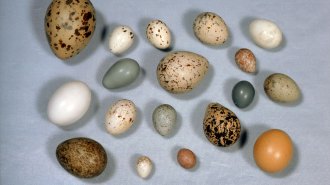Uncategorized
-
 Anthropology
AnthropologyA child’s partial skull adds to the mystery of how Homo naledi treated the dead
The isolated discovery of a Homo naledi child’s skull fragments and teeth plays into idea that small-brained species ritually placed the dead in caves.
By Bruce Bower -
 Animals
AnimalsBaleen whales eat (and poop) a lot more than we realized
The sheer volume of food that some whales eat and then excrete suggests the animals shape ecosystems to a much larger degree than previously thought.
-
 Physics
PhysicsNeutron star collisions probably make more gold than other cosmic smashups
Smashups of two neutron stars produce more heavy elements than when a black hole swallows a neutron star, calculations suggest.
-
 Planetary Science
Planetary SciencePluto’s dark side reveals clues to its atmosphere and frost cycles
Light from Pluto’s moon Charon illuminated the dwarf planet’s farside offering clues about how nitrogen cycles between its surface and its atmosphere.
-
 Space
SpaceA rush to watch a supernova exposed its last gasp before exploding
By studying the final years of stars, scientists hope to find clues to help them recognize when other stars are about to blow.
-
 Materials Science
Materials ScienceLithium-ion batteries made with recycled materials can outlast newer counterparts
Batteries with recycled cathodes outperformed batteries with new cathodes, lasting for thousands more charging cycles before their capacity waned.
-
 Microbes
MicrobesAre viruses alive, not alive or something in between? And why does it matter?
The way we talk about viruses can shift scientific research and our understanding of evolution.
-
 Life
LifeGene-edited stem cells help geckos regrow more perfect tails
Regenerated gecko tails are a far cry from perfect. Now experiments have coaxed geckos to regrow better ones with nerve tissue and bonelike cartilage.
By Freda Kreier -

Looking back on science can refocus our attention
Special projects editor Elizabeth Quill shares her thoughts on how the history of science can help us sharpen our focus on its future.
-

-
 Health & Medicine
Health & MedicineWhat parents need to know about Pfizer’s COVID-19 vaccine for kids ages 5 to 11
Federal health officials authorized the Pfizer vaccine for this age group on October 29.
-
 Math
MathAn elusive equation describing bird eggs of all shapes has been found at last
A new mathematical equation describes bird eggs of all shapes found in nature, and it could have applications in food and agricultural research.